|
|
|
Sort Order |
|
|
|
Items / Page
|
|
|
|
|
|
|
| Srl | Item |
| 1 |
ID:
151648


|
|
|
|
|
| Summary/Abstract |
How do members of the general public come to regard some uses of violence as legitimate and others as illegitimate? And how do they learn to use widely recognised normative principles in doing so such as those encapsulated in the laws of war and debated by just war theorists? This article argues that popular cinema is likely to be a major source of influence especially through a subgenre that I call ‘Just War Cinema’. Since the 1950s, many films have addressed the moral drama at the centre of contemporary Just War Theory through the figure of the enemy in the Second World War, offering often explicit and sophisticated treatments of the relationship between the jus ad bellum and the jus in bello that anticipate or echo the arguments of philosophers. But whereas Cold War-era films may have supported Just War Theory’s ambitions to shape public understanding, a strongly revisionary tendency in Just War Cinema since the late 1990s is just as likely to thwart them. The potential of Just War Cinema to vitiate efforts to shape wider attitudes is a matter that both moral philosophers and those concerned with disseminating the law of war ought to pay close attention to.
|
|
|
|
|
|
|
|
|
|
|
|
|
|
|
|
| 2 |
ID:
084307


|
|
|
|
|
| Publication |
2008.
|
| Summary/Abstract |
The requirement of legitimate authority, though central to medieval and modern interpretations of the just war tradition, has received less attention in the contemporary literature than the other requirements of jus ad bellum. The usual interpretation holds that the kind of entities that have legitimate authority are states, coalitions of states, supranational institutions or national liberation movements and that these political entities are endowed with the authority to wage war. At the same time, contemporary literature on the ethics of international relations is characterized by a revival of the cosmopolitan tradition. This subjects states and quasi-states to stringent legitimacy conditions: according to cosmopolitans, states are internally legitimate-have the right to coerce their own members-if, and only if, they respect the latter's fundamental human rights. The principle of legitimate authority has been criticized in some recent writings on war for not taking account of the implications of (independently defended) cosmopolitan descriptions of state legitimacy. If states are subject to stringent legitimacy conditions such as those outlined above, the criticism goes, they do not possess the right to wage war simply by virtue of their being a state. Rather, the authority to resort to war should be vested in supra-national institutions as well as, or indeed, rather than, states. In this sense war becomes a mechanism for enforcing cosmopolitan moral norms, as opposed to a mechanism for resolving interstate disputes. This cosmopolitan account of legitimate authority needs to be developed to include supra-national institutions. While the author does not deny that such institutions have the moral and legal right to wage war, the aim of this article is to cast doubt on the cogency of the requirement of legitimate authority itself-on cosmopolitan grounds. From a cosmopolitan point of view, the article argues there are very good reasons for dropping the requirement altogether. After sketching out a plausible cosmopolitan account of justice in section two, section three shows that a war need not be waged by a legitimate authority in order to qualify as a just war.
|
|
|
|
|
|
|
|
|
|
|
|
|
|
|
|
| 3 |
ID:
064862
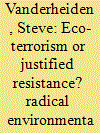

|
|
|
| 4 |
ID:
190699
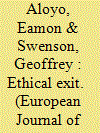

|
|
|
|
|
| Summary/Abstract |
When should peacekeepers partially or fully withdraw from a country or region in which they are operating? This important question has received little scholarly attention. However, it has profound implications. If peacekeepers depart prematurely, as happened in Rwanda in 1994, the consequences can be disastrous with the potential to lead to widespread preventable deaths and human suffering. If they overstay, peacekeepers risk alienating the population they are seeking to protect and undercutting popular sovereignty at significant economic costs. Striking a balance, we propose a framework for just withdrawal that is both normatively compelling and empirically sound. It focuses on three aspects that are vital for understanding when peacekeepers can depart in an ethically justified manner: just cause, effectiveness, and legitimacy. By considering a number of objections, we also address critics who challenge the overarching premise of peacekeeping or might prefer different standards by which to suggest peacekeepers should stay or depart. Finally, we illustrate our argument with theoretical and empirical examples and a discussion of UN peacekeeping in East Timor.
|
|
|
|
|
|
|
|
|
|
|
|
|
|
|
|
| 5 |
ID:
151764
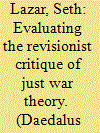

|
|
|
|
|
| Summary/Abstract |
Modern analytical just war theory starts with Michael Walzer's defense of key tenets of the laws of war in his Just and Unjust Wars. Walzer advocates noncombatant immunity, proportionality, and combatant equality: combatants in war must target only combatants; unintentional harms that they inflict on noncombatants must be proportionate to the military objective secured; and combatants who abide by these principles fight permissibly, regardless of their aims. In recent years, the revisionist school of just war theory, led by Jeff McMahan, has radically undermined Walzer's defense of these principles. This essay situates Walzer's and the revisionists’ arguments, before illustrating the disturbing vision of the morality of war that results from revisionist premises. It concludes by showing how broadly Walzerian conclusions can be defended using more reliable foundations.
|
|
|
|
|
|
|
|
|
|
|
|
|
|
|
|
| 6 |
ID:
117029
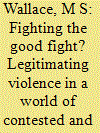

|
|
|
|
|
| Publication |
2012.
|
| Summary/Abstract |
Starting from violence's widely acknowledged status as a wrong, this article critically explores attempts to legitimate violence through appeals to moral frameworks that determine the ends for which violence may be employed. Recognizing that such frameworks exist on all sides of violent conflict, it argues that since there will never be complete agreement on their content or application, nor complete certainty about which moral framework is the 'correct' one, it becomes impossible to distinguish legitimate from illegitimate violence either non-controversially or with certainity. Two problems result: our own 'legitimate' violence may reproduce rather than limit violence by sparking 'legitimate' violence in return, and our own use of violence may actually be unjust, despite our intentions. If we wish to avoid these problems yet maintain our moral commitments - however contested or contingent - we must employ nonviolent means to wage our conflicts, as such means remain legitimate despite disagreement or uncertainty regarding ends.
|
|
|
|
|
|
|
|
|
|
|
|
|
|
|
|
| 7 |
ID:
173366


|
|
|
|
|
| Summary/Abstract |
The cyber realm is increasingly vital to national security, but much of cybersecurity is provided privately. Private firms provide a range of roles, from purely defensive operations to more controversial ones, such as active-cyber defense (ACD) and ‘hacking back’. As with the outsourcing of traditional military and security services to private military and security companies (PMSCs), the reliance on private firms raises the ethical question of to what extent the private sector should be involved in providing security services. In this article, I consider this question. I argue that a moderately restrictive approach should be adopted, which holds that private firms can justifiably launch some cybersecurity services – defensive measures – but are not permitted to perform others – offensive measures.
|
|
|
|
|
|
|
|
|
|
|
|
|
|
|
|
| 8 |
ID:
169103
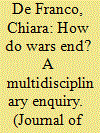

|
|
|
|
|
| Summary/Abstract |
The cessation of military confrontations rarely coincides with the end of war. Legal and political matters continue after the last shot has been fired, civilians driven from their homes try to rebuild their houses and their lives, veterans need to adapt to their new role in civil society, and the struggle to define the history and the significance of past events only begins. In recent years, in particular, the changes in the character of contemporary warfare have created uncertainties across different disciplines about how to identify and conceptualise the end of war. It is therefore an opportune moment to examine how wars end from a multidisciplinary perspective that combines enquiries into the politics of war, the laws of war and the military and intellectual history of war. This approach enables both an understanding of how ‘the end’ as a concept informs the understanding of war in international relations, in international law and in history and a reconsideration of the nature of scientific method in the field of war studies as such.
|
|
|
|
|
|
|
|
|
|
|
|
|
|
|
|
| 9 |
ID:
153071


|
|
|
|
|
| Summary/Abstract |
This article contributes to the current discussions concerning an adequate framework for intelligence ethics. The first part critically scrutinises the use of Just War Theory in intelligence ethics with specific focus on the just cause criterion. We argue that using self-defence as justifying cause for all intelligence activities is inadequate, in particular in relation to the collection and use of intelligence for preventive purposes. In the second part of the paper, we tentatively suggest an alternative moral framework for preventive intelligence, understood as intelligence activities with no specific suspicion or aggressor. We suggest that the moral permissibility of such activities requires a civilised moral framework, in which openness, transparency and informed consent constitute crucial elements.
|
|
|
|
|
|
|
|
|
|
|
|
|
|
|
|
| 10 |
ID:
148126


|
|
|
|
|
| Summary/Abstract |
This article defends the normative status of the right intentions requirement in just war theory. Before we turn to many ethical questions about a conflict – whether there was just cause or whether a war was fought well – we often begin by asking whether the war was rightly intended. Particularly in the contemporary world, where questions of humanitarian intentions and their place in international law is an important political issue, clarifying what we mean by right intentions and showing why they matter is politically very important. Unfortunately, despite the importance of right intentions in the history of political thought, recent discussions give the concept mixed attention, leaving it obscure and difficult to apply. The first section reviews four traditional accounts, showing their underlying (and important) differences and respective weaknesses. The second section of the article argues that these models fail because they are rooted in private instead of public reason. A model of right intentions as public intentions is described and justified, where an intention is only right when the motives that underlie it can be endorsed by the group it is supposed to aid, and the opportunities it provides that group are endorsable by the intervener.
|
|
|
|
|
|
|
|
|
|
|
|
|
|
|
|
| 11 |
ID:
079989


|
|
|
| 12 |
ID:
158726


|
|
|
|
|
| Summary/Abstract |
Does the advent of cyber war require us to abandon the traditional ethical framework for thinking about the morality of warfare – just war theory – and develop principles specific to the unique nature of cyber attacks? Or can just war theory still provide an appropriate basis for thinking through the ethical issues raised by cyber weapons? This article explores these questions via the issue of whether a cyber attack can constitute a casus belli. The first half of the article critically engages with recent attempts to provide a new theory of just information warfare (JIW) that is supposedly better suited to the unique character of cyber war insofar as it is grounded the broader meta-ethical framework of information ethics (IE). Yet the article argues that not only is JIW fundamentally unsuitable as a way of thinking about cyber war, but (in the second half) that it is possible to develop a different account of how we can understand a cyber attack as constituting a casus belli in a way that is in keeping with traditional just war theory. In short, there is no need to reinvent just war theory for the digital age.
|
|
|
|
|
|
|
|
|
|
|
|
|
|
|
|
| 13 |
ID:
051489


|
|
|
| 14 |
ID:
156682


|
|
|
| 15 |
ID:
174245


|
|
|
| 16 |
ID:
151760


|
|
|
|
|
| Summary/Abstract |
A central element of the dominant view of just war theory is the moral equality of soldiers: combatants have equal rights to wage war against one another and are entitled to certain protections if captured, without regard to which side's cause of war is just. But whether and how this principle should apply in asymmetric armed conflicts between states and nonstate groups is profoundly unsettled. I argue that we should confer war rights on fighters for nonstate groups when they are engaged in violence that has risen to the level of armed conflict, and when the state against which the war is being waged is not entitled to assert its monopoly on the legitimate exercise of force, either because 1) the nonstate group has established sufficient control over territory to assert its own governing authority; or 2) because the group is located abroad. Conferring war rights on nonstate fighters does not, however, permit them to engage in acts that violate the laws of war. Fighters who commit such violations are individually subject to prosecution without regard to their group's entitlement to war rights.
|
|
|
|
|
|
|
|
|
|
|
|
|
|
|
|
| 17 |
ID:
141284


|
|
|
|
|
| Summary/Abstract |
This article examines the ethics of using private security companies to undertake combat operations in modern conflict zones. Previous studies on this topic, including those that have drawn on the principles of just war theory, have, out of necessity, been highly speculative because they lacked a strong empirical basis on which to evaluate the behaviour of private security personnel during their operations. Indeed, most scholarship on the ethics of private security companies has relied on a handful of anecdotal examples that happened to receive extensive media coverage. In contrast, this article undertakes the first quantitative analysis of how well the employees of a dozen private security companies adhered to the jus in bello tenets of just war theory and also how their degree of adherence to these tenets affected their tendency to suffer friendly casualties during their security operations in Iraq. It finds that the employees of most of the firms under study exhibited a moderate or high level of adherence to the jus in bello principles of proportionality and discrimination during their security operations in Iraq. Moreover, it also finds that close adherence to these principles did not necessarily expose private security personnel to greater risk of suffering harm.
|
|
|
|
|
|
|
|
|
|
|
|
|
|
|
|
| 18 |
ID:
122089
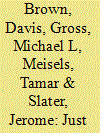

|
|
|
| 19 |
ID:
083014


|
|
|
| 20 |
ID:
084264
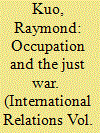

|
|
|
|
|
| Publication |
2008.
|
| Summary/Abstract |
Just war theorists have had difficulty assessing the moral character of occupations, since they often fail to engage with the broader mechanisms and ethical issues of control and power inherent to that state of conflict. These challenges, however, cut to the heart of many of the just war tradition's assumptions, requiring new conceptualizations of its principles and rules for appropriate conduct. This article takes a first step in that direction, recasting the tradition to encompass a wider view of threat and violence in military occupations, using the Israel-Palestine conflict as an illustrative case.
|
|
|
|
|
|
|
|
|
|
|
|
|
|
|
|
|
|
|
|
|